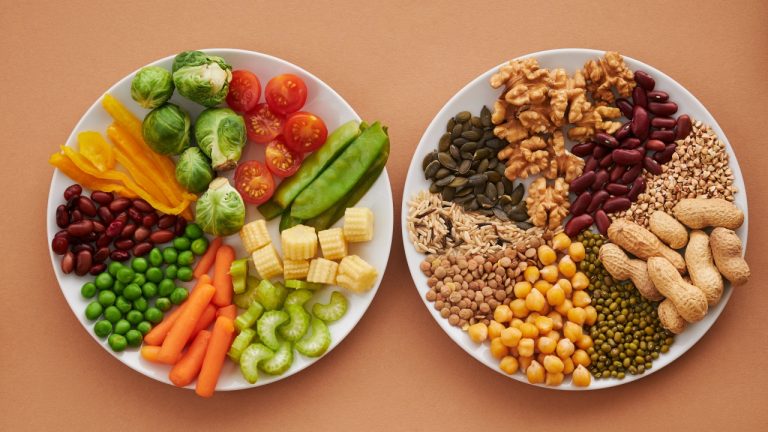Fruits and Vegetables and their Role in a Healthy Vegan Diet

Fruits and vegetables play a crucial role in a healthy vegan diet as they provide essential nutrients, vitamins, minerals, and dietary fiber. They are the foundation of a plant-based diet and offer numerous health benefits. Here’s a closer look at their roles:
Nutrient-rich: Fruits and vegetables are rich sources of essential vitamins and minerals like vitamin C, vitamin A, potassium, folate, and various antioxidants. These nutrients are vital for maintaining overall health, supporting the immune system, and protecting the body from oxidative stress.
Fiber: Plant-based foods are excellent sources of dietary fiber, which aids in digestion and helps regulate bowel movements. A high-fiber diet is associated with a reduced risk of chronic diseases, including heart disease, type 2 diabetes, and certain types of cancer.
Low in Calories and Fat: Most fruits and vegetables are low in calories and contain little to no unhealthy fats, making them ideal for weight management and maintaining healthy body composition.
Hydration: Many fruits and vegetables have high water content, which helps keep the body hydrated and supports various bodily functions.
Antioxidants: Fruits and vegetables are abundant in antioxidants, such as flavonoids, carotenoids, and polyphenols. These compounds help neutralize free radicals in the body, reducing the risk of cell damage and chronic diseases.
Heart Health: Consuming a diet rich in fruits and vegetables is associated with a decreased risk of heart disease. The fiber, potassium, and antioxidants found in these foods contribute to better heart health.
Blood Sugar Control: The fiber content in fruits and vegetables slows down the absorption of sugars, aiding in blood sugar regulation and reducing the risk of type 2 diabetes.
Bone Health: Certain vegetables, such as broccoli and leafy greens, are good sources of calcium, magnesium, and vitamin K, which are essential for maintaining strong and healthy bones.
To maximize the benefits of fruits and vegetables in a vegan diet, it’s essential to eat a wide variety of colors and types. Different fruits and vegetables offer different nutrient profiles, so including a diverse range will ensure you get a broad spectrum of nutrients. Remember to also pay attention to how you prepare them; steaming, roasting, or eating them raw are excellent ways to retain their nutritional value.
Supplementing with vitamin B12, which is not found naturally in plant foods, is often recommended for vegans, as it’s crucial for nerve function and red blood cell production. Consulting with a registered dietitian or healthcare professional can be helpful to create a well-balanced and nutrient-dense vegan meal plan that meets individual dietary needs.



